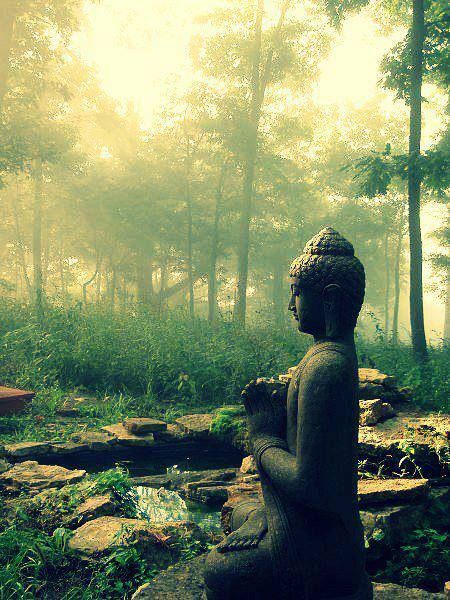By Daniel Scharpenburg
These days I tend to downplay the fact that I went through monk training.
I lead a Zen meditation group now and I certainly don’t want to use the fact that I went through monk training to promote that in any way. That would be inappropriate because I was a monk school dropout.
I went through monk training with an organization that doesn’t have a good reputation. I don’t talk about it much because and I’m careful to not mention the name of that organization. I don’t want to be perceived as talking bad about someone. I don’t know if there’s anything wrong with that organization, really. They didn’t try to take money from me or anything like that, but I just really didn’t connect with their lineage or the teachings of Zen Master Seung Sahn and it seems like people in his lineage are often just repeating things in his teaching style, which is fine. A lot of Buddhist teachers just repeat things from their teacher or just quote their teacher all the time. It’s not at all unusual. But it just wasn’t for me.
In early Buddhism things were probably different.
One would take the vows of a novice, expressing the intent to walk the path of the dharma, and then look for a teacher, probably studying with several different teachers to find the right one.
I took these novice vows a few years ago, but it wasn’t a good fit for me—especially at that time in my life—and left the organization.
These are the 10 novice vows that I took:
The First Precept: I vow to support all living creatures, and refrain from killing.
The Second Precept: I vow to respect the property of others, and refrain from stealing.
The Third Precept: I vow to regard all beings with respect and dignity, and refrain from objectifying others.
The Fourth Precept: I vow to be truthful, and refrain from lying.
The Fifth Precept: I vow to maintain a clear mind and refrain from harming myself or others with intoxication.
The Sixth Precept: I vow to be kind and to encourage others, and to refrain from discouraging others including myself.
The Seventh Precept: I vow to be kind to others and refrain from being boastful and self-centered.
The Eighth Precept: I vow to be generous, to be grateful for what I have, and refrain from yearning for things that do not belong to me.
The Ninth Precept: I vow to promote harmony and refrain from acting in anger or hatred.
The Tenth Precept: I vow to affirm and uphold the three jewels (the Buddha, the Sangha and the Dharma).
Now, I think people are largely expected to stay in an organization or stay with a teacher, but I’d like to suggest that that wasn’t always the case. This is speculation on my part, but I don’t think things used to be as rigid as they are now, because students should have time to have the right teacher, if we’re going to have teachers at all. And having trouble finding the right teacher is, of course, no barrier to serious commitment to the path.
This is generally how I think of myself—as a Novice Monk, as a wanderer, as a cloud. Some say that if you don’t keep going, if you don’t take more vows etc., then you have to give those vows back or something. I respectfully disagree. Vows are a lifetime commitment.
I’ve connected with a lot of teachers, by studying with teachers on the internet and with others on retreats.
Sangha is important, and I’ve studied with several different organizations that give teachings online. We don’t have a Soto Zen community here in Kansas City and Soto Zen is what really speaks to me the most. Being with actual other Buddhists in real life is important though, because you can learn about Zen online, but I don’t think you can really learn to walk the path.
I was practicing with the Rime Sangha here the whole time, but I wanted a Zen Sangha. Being able to go to the Rime Center has been a great benefit to me. I can’t express how much being part of that community has meant to me. It’s a wonderful community, but a lot of the Tibetan tradition doesn’t hold much meaning for me, like the Zen tradition does. It is the one that really speaks to me.
I’ve learned a lot in studying by myself and in studying with teachers online. I can’t say that I’ve had a bad experience. I’ve been pretty thoroughly educated in Zen Buddhist history and theory and I actually learned a whole lot in studying with one of my teachers, Shi Da Dao on the internet. He gave me the Buddhist name that I use and gave me permission to teach in his lineage, the Empty Cloud Lineage of Xu Yun. He did this even though we never met in real life. I read Dogen and Ikkyu all the time, but I can’t really call them my teachers (they’re dead).
But I feel there is a sad truth about Buddhism in the west that we don’t talk about much—ambition.
One can very easily fall into a trap of ambition. “I want to wear cool robes.” “I want to join this or that awesome lineage,” or “I want to be a great Buddhist Master.” And if you want a teacher to feed your ambition and tell you that you’ll become something great, you can find one. They are out there. From what I’ve seen a really good teacher doesn’t promise you anything.
For the longest time I thought I should become a “GREAT Zen Master.” I read stories from Zen history about Bodhidharma, Huineng, Dogen, Huang Po, Xu Yun, Ikkyu, Basho and many others. They are inspiring.
One of the teachers I’ve spent time with (Maezen) once told me, “Drop your attachment to outcome and let the Dharma unfold in your life by itself.”
Now I take that message to heart.
Maezen is my favorite Zen teacher that I’ve met. I’ve talked to other Zen teachers on the internet over the years, and I really think that an internet practice is no substitute for real life practice. She’s a traveling Zen teacher. I can’t really have a formal relationship with her unless I become a traveling Zen student. But, I can tell you this: I served as her Jisha (attendant) on a weekend Zen retreat here in Kansas City and I think I learned more about the path in those three days than I ever thought possible.
Now I lead a Zen meditation group, but I don’t think of myself as a teacher. I’m even teaching a class on the Diamond Sutra at the Rime Center, but I’m still not sure I can think of myself as a teacher.
Now after all this time, I really wonder why I wanted so badly to be a teacher in the first place. I read about Buddhism every day. I don’t read much else, really. I spend more time in Buddhist temples than a lot of people, and I love to write about Buddhism. I really enjoy it.
Maybe those are the reasons why, but is getting credentials necessary in order to be able to write about Buddhism? I don’t think so. Jack Kerouac wrote about Buddhism. Alan Watts wrote about Buddhism too. Hell, even noted scholar D.T. Suzuki was not a Zen Master.
People sometimes expect me to be an authority figure because I write about Buddhism. I’m about as out as you can be. No one that knows me wonders what my spiritual beliefs are. I’m always carrying Buddhist books. I’m talking about the Dharma to anyone who is interested. Oh, and I have some Buddhist symbols permanently tattooed on my body. On my right arm I have a blue lotus, an OM, a Bodhisattva, and an endless knot. So, anyone that wants to talk about Buddhism knows that I’m someone who they can talk to about it before they even know my name. Is that why I got these tattoos or is it because tattoos are cool? Who knows.
I’m not an authority figure, not really. I’m as mired in suffering as everyone else. I’m confused and I make plenty of mistakes, probably more than my fair share. I’m not a role model and I am full of flaws.
As Kerouac said, “I had nothing to offer anyone except my own confusion.”
The only thing I can really do when people ask me for advice is point to the mistakes I made. I can definitely tell you what I did that didn’t work out well. My regrets are numerous.
I’ve written about Bodhisattva Vows before and Dharma Transmission as well. I have received certificates. I am a “certified Dharma teacher” and a teacher in the Tibetan tradition as well. I was given the title Gegan (teacher) by Urgyen Palden Gocha. I’ve taken Bodhisattva Vows and done all sorts of other things but I have to acknowledge that education and practice aren’t the same thing. There are Buddhist colleges that train ministers. But that’s not the way we become Buddhist clergy (whatever that means). All training is on the job. I think we do a disservice to the Dharma if we make it about training to be a minister. It should be about awakening.
But, and this is important, Buddhism isn’t really something you learn, it’s something you do. My hero Ikkyu tore up his certifications when he got them because he didn’t take them seriously.
I think Vows are something you take for yourself and not for some other person or organization. I believe those have meaning no matter what.
There are three things that have traditionally been fundamental to Buddhist practice. One is practicing by yourself at home, the second is practicing with a community once in a while and the third is following an example, spending time with a teacher who has more experience than you.
I’m no one’s master, that is clear. I’m just a wandering cloud. I am a student on the path, just like all of the other Buddhists.
I won’t be your master, but I’d love to be your spiritual friend.
Photo: (source)
Editor: Dana Gornall
Comments
- Review of The Power of Mind: A Tibetan Monk’s Guide to Finding Freedom in Every Challenge {Book Review} - August 23, 2022
- The Path to Peace: A Buddhist Guide to Cultivating Loving Kindness by Ayya Khema {Book Review} - July 21, 2022
- That is Not Your Mind! Zen Reflections on the Surangama Sutra {Book Review} - July 16, 2022





